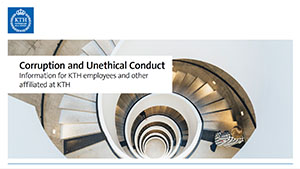Bribery
At KTH, we must always act in such a way that no one can doubt our neutrality and our independence. We must therefore always be observant of situations that may be considered as the taking or giving of a bribe.
The definition of taking a bribe is when you as an employee or client, on your own or someone else’s behalf, accept, are offered, or request a bribe or any other undue benefit or personal bonus for the performance of your duties. The person handing over, promising, or offering the bribe is guilty of giving a bribe. Whether or not a benefit can be considered undue depends on the circumstances in the individual case. Examples of benefits that may constitute bribes include:
- cash and gift cards
- money loans
- discounts
- hidden commissions
- holiday and recreational travel, other travel, hotel stays, conferences/events
- activities of a purely entertainment nature
- dinners
- tickets
Requirements are generally stricter for public administration employees and contractors than for private sector employees. As a KTH employee and contractor, you must never abuse your position. One group that is particularly sensitive with regard to integrity and that must exercise great caution at all times is employees engaged in the exercise of public power and public procurement.
As an employee and contractor, you are always responsible for keeping yourself informed of what currently applies. In order to avoid liability for bribery, you must explicitly and immediately reject the bribe. This requires taking action, clearly saying no when offered anything that may be considered a bribe. Otherwise, you risk committing bribery (merely throwing the offer in the bin is not enough). Notify your immediate supervisor or other person in charge of what happened.
Learn more in the KTH Guidelines for handling bribery .
How do I know?
If you are uncertain as to whether the gift you are being offered may be considered a bribe, you should never accept it. A rule of thumb is that it is always more delicate if you receive and accept something personally. A ticket to a movie that is sent to you from a supplier should be returned – or raffled off among employees. A fruit basket, box of chocolates, or souvenir may be accepted if you put it in the staff room of your department and notify the giving party of your intention to do so.
A lunch, dinner or overnight stay in connection with, for example, a networking event organised by another government agency in Sweden is permitted. However, if you are invited to an event by a supplier or collaborating company/organisation, you should always consider the purpose behind the invitation. May you be influenced in your performance of your duties, is the benefit you are receiving appropriate or undue, etc.?
Accepting a lunch as part of a day programme is usually in order. You should, however, say no to lunches, dinners, and other benefits that are more lavish and “out of the ordinary”. Remember that even if an incidence is not to be considered a bribe, there may be times when you must report it to your employer as a meal benefit or other benefit.
As a researcher, you should be careful about accepting travel and events paid for by a third party. Always ask yourself what the purpose of the invitation is. If it involves a party that in any way may aim to influence you in your role as a researcher at KTH, you must decline, even if the trip or event takes place in your leisure time.

